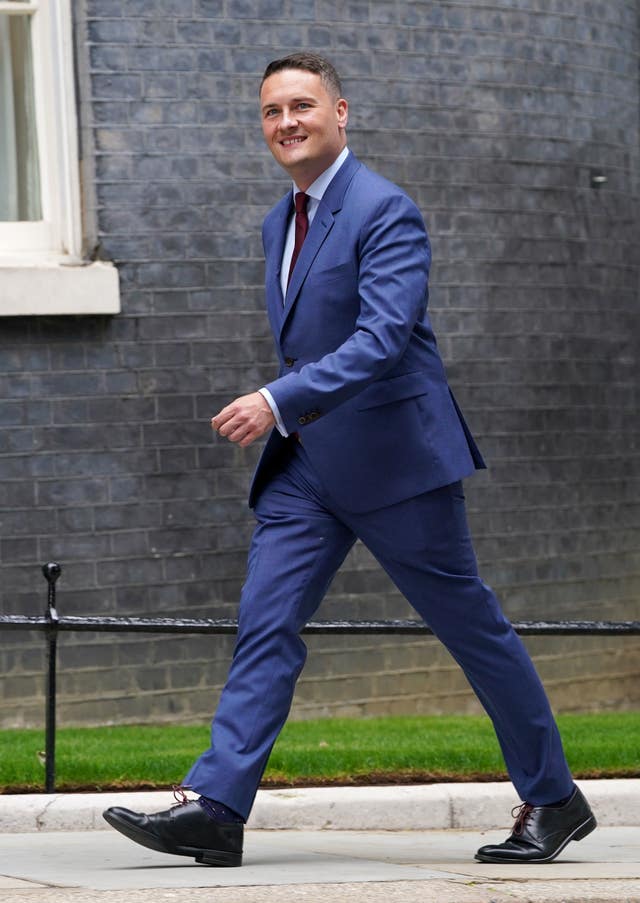The Health and Social Care Secretary has said he is “optimistic” that the dispute between the Government and junior doctors in England can be brought to an end.
Wes Streeting said that a meeting with junior doctors from the British Medical Association (BMA) marked a “reset” on relations between the two parties.
He said both sides had shown a “willingness to negotiate” but he warned that finding an end to the dispute would “not be easy” due to the economic circumstances of the country.
It comes as Dr Vivek Trivedi and Dr Robert Laurenson, co-chairmen of the BMA’s junior doctors committee, hailed a “positive first step” towards ending their long-running dispute over pay.
🤝 The Health and Social Care Secretary met @BMA_JuniorDocs Committee leaders this afternoon.@WesStreeting: "I listened to their concerns and reiterated my determination to end this dispute, so we can put everything behind cutting waiting lists and improving patient care." pic.twitter.com/pfKT91pfcB
— Department of Health and Social Care (@DHSCgovuk) July 9, 2024
They said there were no plans for more strike action “at the moment”.
The parties are set to meet again next week.
Mr Streeting said: “I met face-to-face with the junior doctors committee today to hit the reset button on relations between the Government and junior doctors.
“Patients, staff, and the NHS have already paid too high a price due to strike action, and I’m optimistic that we can bring this to an end.
“It’s not going to be easy. This government has inherited the worst set of economic circumstances since the Second World War. But both sides have shown willingness to negotiate and we are determined to do the hard work required to find a way through. I am angry about the way the junior doctors are treated in the NHS, and there is a lot we can do to change that.
“Junior doctors are the future of the health service and I want to work with them to turn around our NHS.
“I’m looking forward to meeting them again next week to discuss what went wrong in past talks, and to make further progress on finding a solution to this dispute.”

After the meeting, Dr Trivedi said: “It was a positive meeting, we were pleased to be able to meet the Secretary of State and his team so quickly after the General Election – it signifies the urgency that they’re placing on resolving this dispute which has already lasted 20 months.
“The meeting today was positive and we’ve already agreed to meet again next week with the Secretary of State to further discuss how we can progress.”
Dr Laurenson added: “This meeting was definitely a positive step, but I don’t think we can place a value, or a certainty on how quickly things are going to take to resolve, or what might need to happen to make things resolve.
“This was definitely a collaborative talk, and I think it’s fair to say we have no plans at the moment to call for strike action.
“This is a complex negotiation and it’s going to take some time.
“This was a positive first step, but that’s all it was, the first step. There’s much more meat that needs to be added to the bones before we’re going to be able to come out with any sort of agreement.”
Junior doctors in England say their pay has been cut by more than a quarter over the last 15 years and have called for a 35% increase, but Labour says it cannot afford to meet this demand.
Speaking at the Tony Blair Institute’s Future of Britain Conference 2024 earlier on Tuesday, Mr Streeting said: “In opposition, we were very clear that the headline 35% pay demand is not one that we could afford, and that has not changed since the General Election.
“The reason we were so blunt in opposition wasn’t simply about delivering a tough message, but about showing them the respect I think they are due, and a key ingredient of respect is honesty.
We were pleased to speak to new health secretary @wesstreeting today to get the ball rolling on negotiating a solution to our dispute – and we have agreed meeting next week. As we have always been clear, only a credible offer, acceptable to our members, will do.
— Junior Doctors (@BMA_JuniorDocs) July 5, 2024
“Secondly, beyond pay, there are a whole range of issues about how junior doctors are treated by their employer which I am genuinely angry about – in terms of their placements, their rotations.”
Health leaders urged the Government to resolve the dispute as a priority after NHS England said 61,989 appointments, procedures and operations had been postponed as a result of the latest walkout from June 27 to July 2.
The strike was the 11th by junior doctors in 20 months.
Since December 2022, there have been strikes across a number of staff groups in the NHS including nurses, other doctor groups, physiotherapists and paramedics.
Collectively, the industrial action has led to nearly 1.5 million appointments, procedures and operations being postponed, at an estimated cost to the NHS of more than £3 billion.




Comments: Our rules
We want our comments to be a lively and valuable part of our community - a place where readers can debate and engage with the most important local issues. The ability to comment on our stories is a privilege, not a right, however, and that privilege may be withdrawn if it is abused or misused.
Please report any comments that break our rules.
Read the rules here